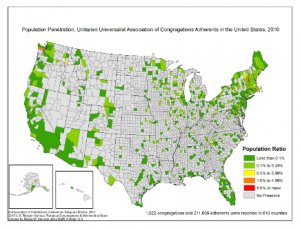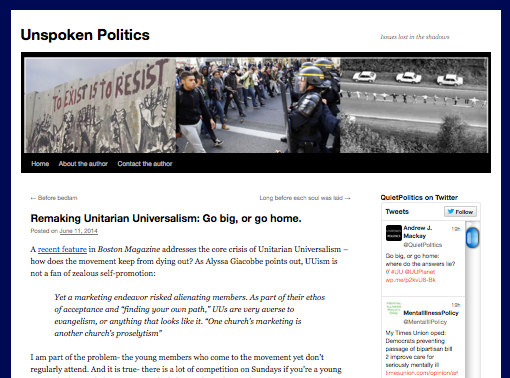Recently, I talked with Kurt Kuhwald, former professor at Starr King School for the Ministry, about the school’s search process for a new president. Kurt had some interesting things to say about the search, and the conflict that erupted during and after the search.
Before I get to Kurt’s thoughts, you may want to review what happened at Starr King. I have a short post about the situation here. Since I wrote that post, the New York Times covered the story in a balanced and well-written article here, and UU World did a carefully-written article in November which you can read here. Now back to Kurt.
Kurt is someone for whom I have great respect, particularly in his thoughtful and passionate approach to ethical issues, and to issues of prophetic importance. I was lucky enough to have lunch with Kurt a couple of weeks ago, and we talked about several prophetic issues: global climate change; the protests following Ferguson; and the mess at Starr King. We wound up spending most of our time talking about Starr King, not because it is of greater importance than Ferguson or global climate justice, but because it was so fresh in the minds of both of us. Actually, mostly I listened — Kurt has a unique and powerful interpretation of the Starr King situation, and I wanted to hear what he said.
Kurt has been kind enough to send me several documents that he is willing to make public, and with his permission, I am posting them here on my blog. You can click on one of the links below to go to a specific letter, or just scroll down to read these four documents in order:
Kurt’s letter of resignation from Starr King;
An addendum to that letter giving more detail on his reasons for resigning;
A letter to the Ad Hoc Committee set up by Starr King to investigate the situation;
A letter to the members of the UUA Board regarding Starr King.
As I talked with Kurt, it struck me that there was a deep current of theology running through everything Kurt said. He is talking about a theology of power; he is critiquing one way power is wielded in contemporary religious institutions. This is an incredibly important critque. I believe it would behoove anyone with an interest in the mess at Starr King to read or re-read Bernard Loomer’s important 1976 essay “Two Conceptions of Power.” Finally, out of respect for Kurt’s deep theological insights, I’m going to say that if you’d like to comment here you should exhibit some theological thinking. If you’re not sure how to think theologically about this issue, read Loomer’s essay.
As always, I reserve the right to delete or edit comments that I feel are discourteous, rude, or off-topic.
Scroll down to start reading Kurt’s letters….
Update, 14 January 2015: Kurt Kuhwald asked me if I’d be willing to post Dorsey Blake’s letter of resignation from Starr King; until January 9, he was Associate Professor of Spirituality and Prophetic Justice. Since Kurt Kuhwald and Dorsey Blake timed their resignations for the same day, and since they share a prophetic vision for liberal religion, I felt it was appropriate to add that letter to this blog post. Having received Dorsey Blake’s permission, I have added his letter below:
Dorsey Blake’s letter of resignation





